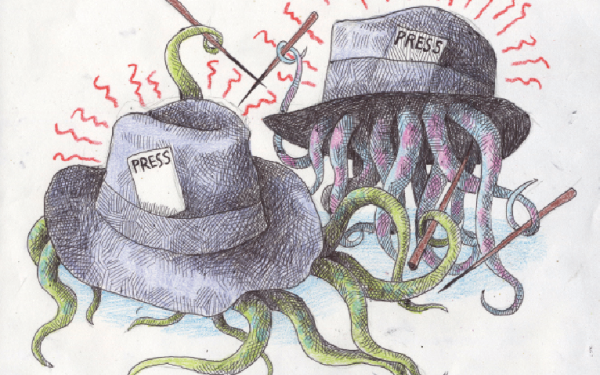McGill Students Want Information on Military Research
Student activists within Demilitarize McGill say the university is trying to avoid releasing information on military research by delaying the access to information process.
The university is obliged to respond to access to information requests within a month, but some student activists say their requests are being blocked.
Cadence O’Neal was a first-year student when she filed a request in 2012 for all communications between researchers at McGill’s Computational Fluid Dynamics Laboratory (CFD Lab), which develops software, de-icing and aerodynamics technology. O’Neal says the lab plays a role in developing military drones. Her information request asked for all emails between the CFD lab and companies like CAE, Bell Helicopter, Bombardier and Lockheed Martin, as well as all research topics at the lab.
McGill sent her all of the research topics, but O’Neal says she’s still waiting on the emails, which add up to 8,944 messages in total. Her case is going to the Commission responsible for access to information law in October.
“I’m quite sure McGill wouldn’t be fighting so hard to avoid giving us this information if there wasn’t anything interesting in it,” O’Neal said.
McGill graduate Kevin Paul also challenged the university for redacted documents he received in response to a request for research contracts with the Shockwave Physics Group, which studies explosive and detonation technology.
The university says it’s doing its best to disclose documents, but that not all documents are accessible.
“For example, McGill alerted private sector sponsors (mostly corporations that fund the research) when such documents were requested, and some sponsors objected to disclosure, as is their right,” communications director Carole Graveline wrote in the statement.
She cited concerns of intellectual property with commercial value, or “emails with results or research strategies sponsors do not want disclosed.”
“It does not mean there is something untoward in the research,” the statement continued. “This group of students and former students keeps asking for the same or very similar documents, which the University and/or the research sponsors believe are not accessible pursuant to the law.”
In 2012, McGill accused students, including members of Demilitarize McGill, The McGill Daily and The Link of using access to information requests as “retaliation measure against McGill in the aftermath of the 2011-2012 student protests.”
The university asked for the right to block access to information requests by students affiliated with The Daily, The Link and the website McGilliLeaked, which publishes all documents released by the university through requests. High-profile lawyer Raymond Doray represented McGill at the time, and O’Neal says he will represent the university at the hearing in October. The students will be self-represented.
In their 2012 petition to the Commission, McGill called the access to information requests “frivolous” or targeting “trivial documents and information such as documents and information pertaining to the filling of a refrigerator.”
Requests filed at the time sought all documents related to military research contracted by companies and the Canadian government, including O’Neal’s request, but also asked for administrative expenses such as catering receipts.
The Commission rejected McGill’s request, citing the Commission’s exclusive right to reject access to information requests it deems abusive.
“[The ruling] meant that they would have to give us the information that we asked for and McGill said they weren’t going to give me the emails,” O’Neal said.
“[McGill] still has the right to argue with us on an individual basis, so we’re still stuck here without the original information that we asked for in 2012.”

_900_600_90.jpg)





